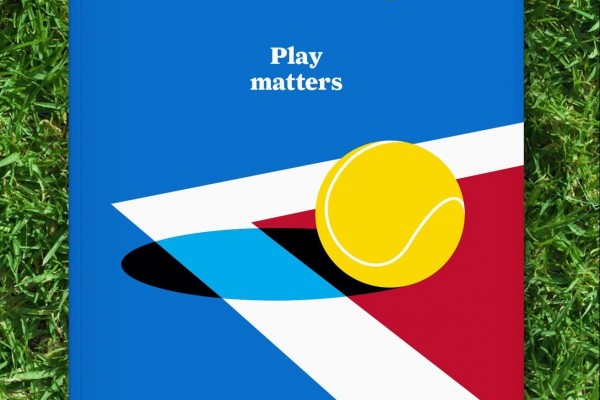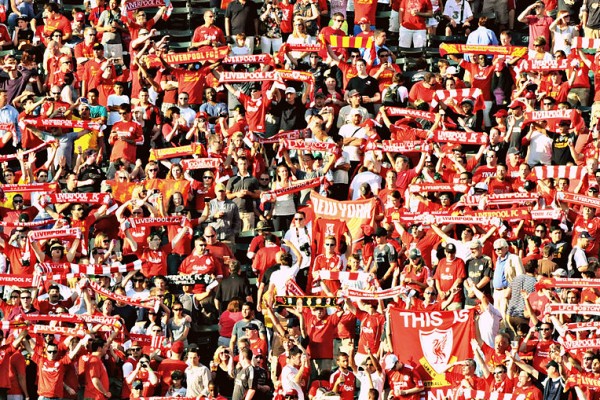Interviewee: Simon Critchley. Interview by Nigel Warburton.
Nigel Warburton: You’ve just written a book called ‘What We Think About When We Think About Football’. How did the book begin?
Simon Critchley: The book began with an interest in football which goes back to when I was two years old. And I have written some three or four journalistic pieces on football, particularly around World Cups. But then I was teaching with Taylor Carman from Columbia. We were teaching texts together and we did Hans-Georg Gadamer. We took the chapter on play from Truth and Method. That’s where I saw that this could really develop in interesting ways because Gadamer is fascinating. He is thinking about the phenomenon of play and what’s going on in play. The essential point is that what’s going on in play is reducible neither to subjective qualities nor objective reality. Play is this phenomenon which takes place in the space between human beings and the objective world. The key thing for him is that play does not take place in our heads. There’s a chapter in my book called “De-subjectifying Football” and what I’m trying to do there is to get us to be able to describe two things. There’s both the experience of play when you’re actually playing. When you’re playing a game, are you in your head? Well, obviously, your head is involved and your cognitive faculties are important, but the experience of play is an experience of being outside yourself amongst the movements of play. And then, secondly, the experience of being a spectator isn’t being in your head. It’s being out there alongside what’s happening on the pitch. Play in general, and football in particular, are wonderful ways of bringing out this dimension of experience that’s between the subjective and the objective, which just happens to be what I would just call the world.
It is a very different phenomenon when someone’s engaging with an imaginary world, where it’s a make-believe game, and something like a sport where it’s not really the same sense of play. With sport, you are engaging in activity within a set of rules and norms, but you’re not imagining something in that sense. You might be imagining moves you might make but you’re not creating a fictional world.
Yes and no. If you think, for example, of every young boy’s fantasy when you’re doing football commentary in your head. That is imaginary play. It’s imaginary play in relationship to existing sport, but that’s not what happens in the game. Obviously, the experience of play in a game, and this is essential, is governed by laws. It is governed by the seventeen laws of association football and then the customs, norms, and practices that go along with that. But that’s a fiction. It’s a legal fiction and it’s a fiction which we go along with in order to enable the game to be played. If we didn’t accept those laws, then there would be no football. But it doesn’t mean those laws are cast-iron. They can be bent and warped. Still, it’s a fiction of a different kind. One of the things that really interests me about play in general but football in particular is that when you’re watching a live game, when you’re at the stadium, it’s real – you’re really there at the match – but it’s also as if you’re in some virtual environment. For example, I talk in the book about the Emirates Stadium which was the first time that I really experienced this. If you’re there in the Emirates, there you are as a human being watching this actual game-play but it’s as if you’re watching a computer simulation because it looks too real.
With the floodlights as well, they tend to exaggerate the greenness of the grass.
Exactly – football is a real fiction but it has a hyperreal quality which is what draws us to it. And the colours, for example, are really important. But the key theme is that play isn’t in our heads, neither for the players nor the spectators.
It’s also got a feature that a lot of sports don’t have. One of the reasons that football is described as beautiful is because at the heart of it is improvisation to unfolding circumstances. It’s not like a rowing race or a sprint, where there is relatively little scope for putting your personal stamp on things and making some kind of genius move. But within a team sport, you are reacting to all the other players on the pitch, sometimes to the crowd and the referee and the linesman and where the ball is in your peripheral vision. They are all affecting what you do next. The greatest players are capable of this supreme improvisation where they see a possible set of moves that nobody else could see until it was done. It is just mindboggling how some of them do it. They can improvise a pass or a jink or something like that and throw everybody the wrong way. To me, it’s clear why people call it a beautiful game. And the improvisational element is a classic feature of play: you’re making it up as you’re going along, it’s not a script that you have to follow.
Yes. It’s like jazz in that way. There’s a series of constraints – there’s a song, there’s a chord sequence and a series of norms governing the instruments and the tune – but within that you get to move. I talk somewhere about Thomas Muller and the “false nine”. In German he’s called the “space interpreter” or the “space investigator”: Der Raumdeuter. The improvisation is linked to the improvisation in relation to space. In a sense, all a great player does is to interpret space and to find space and then, when they’ve found that space, to improvise something. A great player is a player that can make space around them. Now, obviously, that’s nonsensical objectively, but in terms of the phenomenology of the experience of the game, a player can invent a bubble of space and give themselves time to improvise something. The other thing is the collaborative side of it.
You mention the social aspect very early in your book. Not the social in terms of camaraderie, but non-verbal communication and expectations and the way that you can anticipate and understand other players and what they are intending by the subtle cues that they give.
The distinction is more clearly marked in American sports like baseball and American football and to a lesser extent with basketball, but there are fewer players in the team and it still tends to be dominated by certain key figures. Whereas, football is a collaboration between the whole team but often a team that’s playing well will have four or five players moving together as a kind of moving matrix. And that moving matrix is able to open space in places where there is no space. When Liverpool is playing well with those front four players, it’s like that: like a little matrix that’s opening space against a defensive unit where there is no space. The fanciful side of the book is where I say that the form of football is socialism and invoke Bill Shankly and Brian Clough and others in that regard. That’s something I want to be true, but I know it’s an absurd thing to say because obviously football is individualistic as well and football is dominated by money.
What I think is interesting is how you make that claim but then you play it off against the capitalism that dominates the way that players are treated within the game. They become very valuable assets to clubs and are bought and sold like stocks and shares, often without too much say in what’s happening to them. They are owned by the club and they become liquid assets that are realised at certain key points by capitalists. And yet they are playing a game that has essentially got the marks of a socialist state, as it were, where people are collaborating to achieve a common end rather than acting solely for their own personal good. There is this interesting phenomenon which I mentioned to you before which is that – certainly in Britain – the way that young players learn to play the game has a different kind of tension. Within football academies, players in the same team are actually competing amongst each other to become professionals. From a squad of, say, fifteen players, maybe two will go on to become apprentice footballers. And they know that. So, there is a sense in which the very educational system ingrains a kind of competitiveness which is unhealthy because it makes rivals of your teammates. They are trying to show that they’re great collaborators but also trying to show that they’re great individualists and worth taking to the next stage in football. In a sense, it mirrors that tension between socialism and capitalism at the heart of football, which you identify nicely in your book. There’s a kind of collaborative socialism in the training, with an underlying individualism which could have been something out of Ayn Rand where the toughest one survives and you shouldn’t look back.
Yes, that’s undeniably true. I don’t have much experience of that but from everything I’ve read about what it takes to get through football academies and move through the ranks, it’s a highly individualistic activity. You could maybe finesse that by pointing towards ideas of excellence in that kind of Aristotelian spirit, or you could think about that in terms of the strange situation where what you want is a team but you want a team where every player is fighting for their place and that can be replaced if they perform badly.
Excellence is an interesting question as well. In football, in each position, there are criteria by which individual players are judged and there are overlapping subjective opinions, but there’s not a complete consensus about who is the best in each position. There are individual features of individual players, and it’s not an objective judgement that one player is better than another. There’s also a problem of intransitivity where A might be better than B and B might be better than C but it doesn’t follow that A is better than C, because they have a number of different features as players and they’re not really commensurable. There is no common currency to judge players. This happens all the way through football from the lowest to the highest, there’s a degree of subjectivity in the choices that people make about who is the better player, with the added twist that managers are often making decisions about who is the better player for the team they want to create. It may not be objectively just the better player, but the better one that fits into the way that they want to play the game.
Sure. To give an example, you could say that Daniel Sturridge is a better player than Roberto Firmino technically, but he doesn’t fit into the team-system that Jürgen Klopp wants to build at Liverpool. So, Daniel Sturridge has now gone on loan to West Bromwich. He was an unquestionably excellent player but didn’t fit within that team structure. Also, there are great players who become great players within certain unique team structures and very often that doesn’t translate. Someone like Mkhitaryan was an outstanding player for Dortmund but didn’t cut it at Manchester United and we’ll see what happens with Arsenal. There are players like that whose excellence depends on the apprehension of their excellence within the collaborative unit of the team as dictated by the coach. That’s the other thing politically about football. There’s a collaborative association of the game, but we seem to want a kind of authoritarianism or even dictatorship in the coach. And if the coach isn’t an authoritarian then we think they’re weak.
I think it’s a kind of auteur theory applied to football. A film is a collaborative creation with a director making final decisions but the auteur theory talks as if the director was the only person who did anything creative or important. Whereas obviously actors and lighting experts and cinematographers have a huge part to play in the final result. And, often, commentators lapse into an auteur approach to managers as if every success or failure comes down to the manager rather than the players on the pitch. But what you’re doing with this book, as I understand it, is doing philosophy in the style of a phenomenologist. You are interrogating, as it were, the consciousness of football from the perspective of the player and spectator. So, you are really interested in descriptive philosophy. Is that right?
Yes. It’s phenomenology but also, as I see it, it’s very close to the spirit of someone like William James who has become much more of a hero of mine in the last few years. What James is about is trying to get close to the grain and texture of experience and not to judge it from some safe philosophical distance, but to try to use words and the method that one adopts in order to get close to the experience, evoke it, and show it under a new ‘aspect’, as Wittgenstein would say. That’s really all I’m trying to do.
You certainly achieved that for me. One of the great things that I took away from the book was how you talk about the stupid question that players get asked: “What were you thinking when you took that shot?”
Nothing, they weren’t thinking anything, they were engaged in the activity of play. That’s the point. I think the players who are playing are engaging in the world much as we engage with the world. It’s just that we ask the wrong questions. It’s not a question of what’s going on in their heads, it’s what we do in a particular situation in relationship to others. Play makes that explicit to us. So, yes, the questions that are asked are really stupid. There’s a subjectivism in football as it were, you can ask the footballer what they think – and that will have authority – but also an objectivism in football, the idea that we can get the truth of football by analysing data and the way in which in the last ten years football has become increasingly dominated by the number of passes made and received, and assists. They can easily measure that. But it tells you absolutely nothing, really.
There’s no Moneyball equivalent in football then?
Football is something that takes place between our heads and external reality. It’s that space of play. That’s something that a group of human beings in the right situation, under the right shaping and direction from a coach, can make into something extraordinary. Either beautiful or very hard to beat, depending on whether you’re Guardiola or Mourinho. So, the book is decidedly not a philosophy of football. It’s not trying to find a series of categories or axioms or a priori principles that describe football. That’s of no interest to me. It’s a question of trying to go into the experience and pull out from it certain conceptual insights. That’s really what interests me. It’s phenomenology but also a kind of pragmatism as well. It’s trying to attend to the richness of experience and then to try and persuade other people: to say, “This is fantastic, why don’t you take a look?” That’s an argument that you have to make in a different way in somewhere like the United States where people will be brought up with baseball. I find that the closest relationship to football in the United States is through something like baseball. People have their team and they have to support their team. You’ve got to try and persuade the sceptic that football’s not boring because it’s low-scoring! You’ve got to say that sport is not about scoring or winning. It’s about playing.
I love that quotation you have in the book about the perfect game being a goalless draw. That, to me, is the kind of insight that makes you see the game differently. You were talking about the Wittgensteinian aspect shift where you suddenly see the same thing under a different description. That is the kind of comment that stops and makes you think again about what it is you’ve been watching because it’s often described as a boring game simply because of the outcome. You could have watched it on social media rather than being there. But, actually, if you see it as a complex set of moves with anticipation and countermoves, you can see an incredible beauty and complexity. You can see that as the supreme achievement of two teams, to engage with each other and fully understand each other.
Yes, I think the beauty of defensive football is really underrated and misunderstood. But there’s also the type of defensive football that relates to cheating and bending the rules. There’s a beauty in watching a defender stop something and foul someone. There was a game, I think it was the European Championship last year, and I saw a couple of those in Italy. Italy were playing Germany and Sami Khedira for Germany had been particularly dangerous in the previous game. At a certain point quite early in the game, the great Italian defender Giorgio Chiellini just leant across him and moved a certain way and trod on his foot in such a way that he was then out of the game. There’s a kind of beauty to that. He didn’t even get a yellow card for that, and that’s extraordinary defensive excellence. Another thing that irritates America about football (soccer) is that people are pretending or cheating, whereas that’s the point. This is where I’m a sceptic about video replays. I think, in principle, video replays are great. But you can play something back and have it affect the flow of the game and then you realise that what the game is about is not making the right decision, it’s about making a decision. In a complex contingent situation, the referee is the person who does that and they do the best they can. One hopes that they get it right. You have to accept that it’s not going to be a determinate cast-iron rule. So, I think the wish to eliminate cheating from football is also suspicious and misplaced. I quite like cheating in that way.
We’ve talked about the combination of phenomenology and pragmatism. Do you think that philosophers should be applying this more widely? There’s quite a narrow range of topics that philosophers actually talk about. It’s only recently, for instance, that food has become a very serious topic for philosophy. Philosophy and sport doesn’t have a huge number of eminent contributors to it. Philosophy of music is usually all about listening. You rarely hear about playing, and yet the phenomenology of playing music is something that is very important for many people’s lives. Do you think there are areas that would benefit from this approach?
Yes, absolutely. Philosophy of sport is not exactly a huge area of interest. There was a good book by David Papineau last year which I enjoyed, and there’s a good book by Steven Connor on the phenomenology of sport which I liked a lot. But there’s not a huge amount. For me, what is perhaps most interesting about football is that in a lot of cases one has a deeply held commitment to a team. It’s something almost like a faith. It’s an unquestioned passion that’s built up over time which you’ve often inherited from your parents. On the other hand, there’s an enormous space of rationality in relationship to football, that football is something that allows for evidence-based argument and so forth in a way that often philosophy is not capable of. Another thing which interests me philosophically about football is that philosophers don’t change their minds. Philosophers listen to another philosopher and then go on believing the same thing and then will maybe ask some hostile critical questions. At the end of the paper, you never hear someone saying, “That’s completely brilliant, I’ve completely changed my mind on the issue of perception”. That never happens. Whereas in football, because it’s not serious in a way, because it’s play, you can allow yourself that play-space. Very often it has happened to me. I’ve got a deep commitment to Liverpool Football Club and I can make arguments back and forth, but I can hear someone who supports another team make a case and you just have to accept that that’s true, and you have to change your point of view. So, something about the rationality of the arguments around football is something that is instructive for philosophy. I know it sounds odd to say that, but I think that’s the case.
What’s also interesting about that is the fact that it’s much more comprehensive in the sense that you can have really elaborate football conversations with a ten-year-old. There’s no problem there. They know a ton of stuff. It doesn’t require an extraordinarily high level of knowledge. So, there’s a way in which you can stretch the use of argumentation and reason to non-specialists and also across ages and generations. I think that’s great, and that it should be taken more seriously.
Simon Critchley is Professor of Philosophy at the New School for Social Research in New York. He was the moderator of The Stone, an opinion series in The New York Times, and has written for The Guardian, The LA Review of Books, and The New York Review of Books. He is the author of 29 books, including What We Think About When We Think About Football, Suicide, How to Stop Living and Start Worrying, and The Book of Dead Philosophers.






